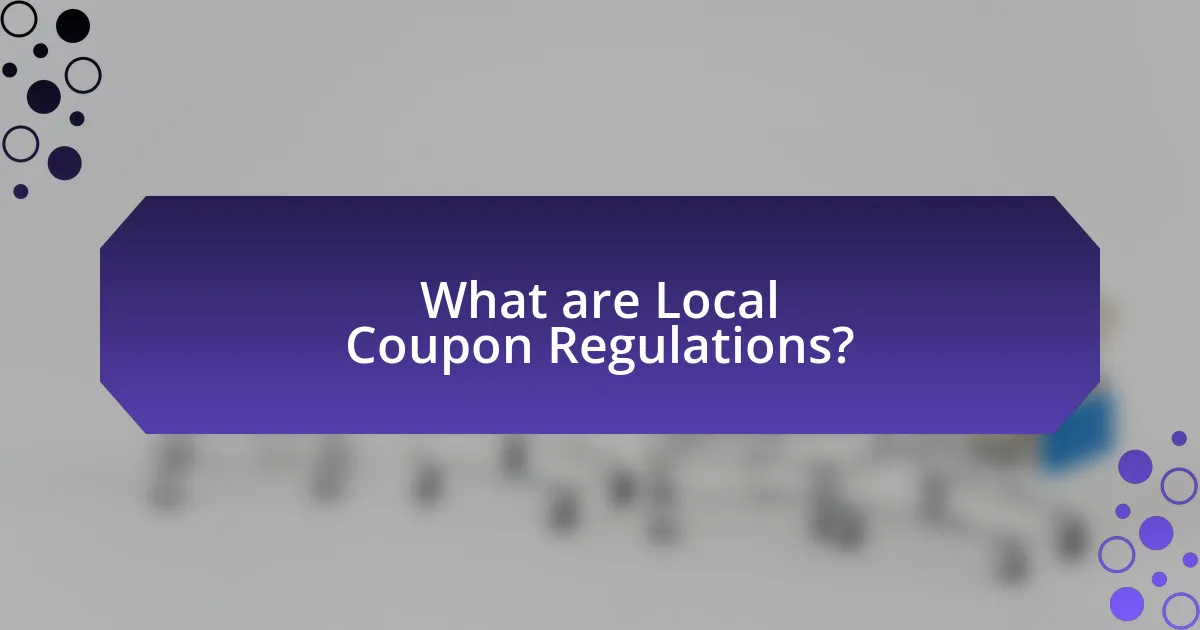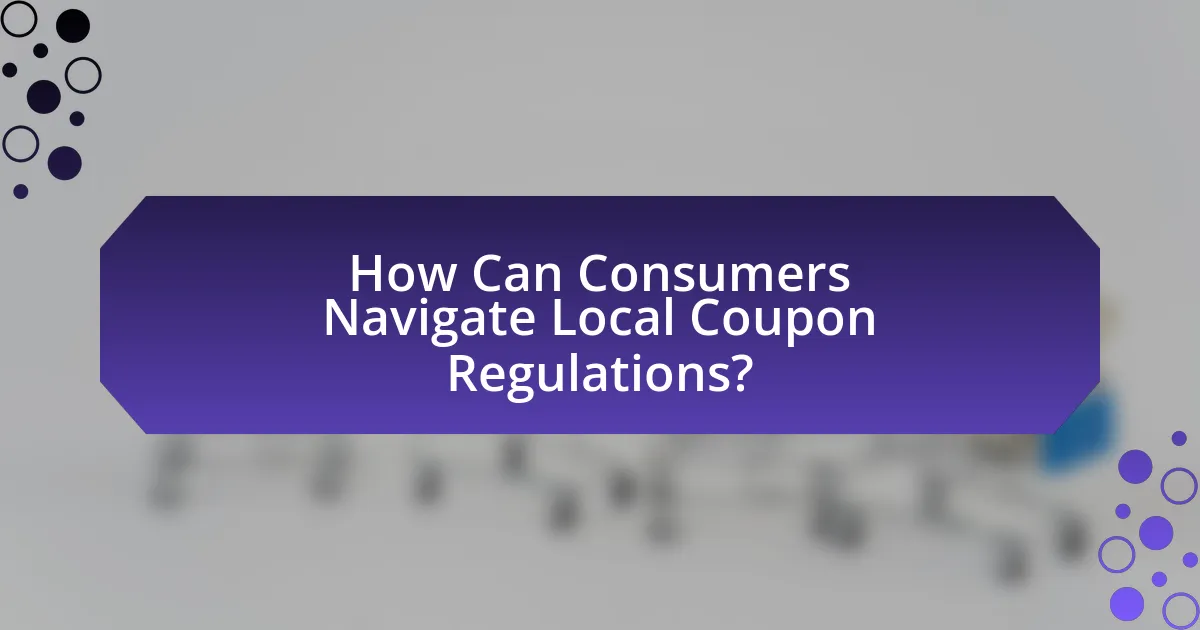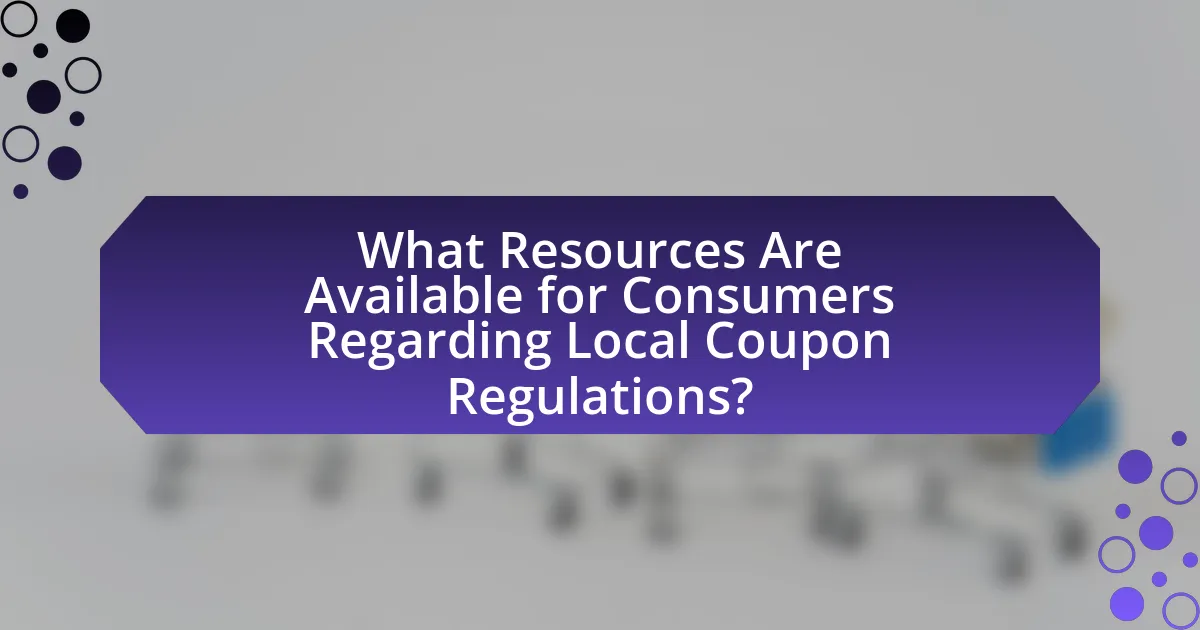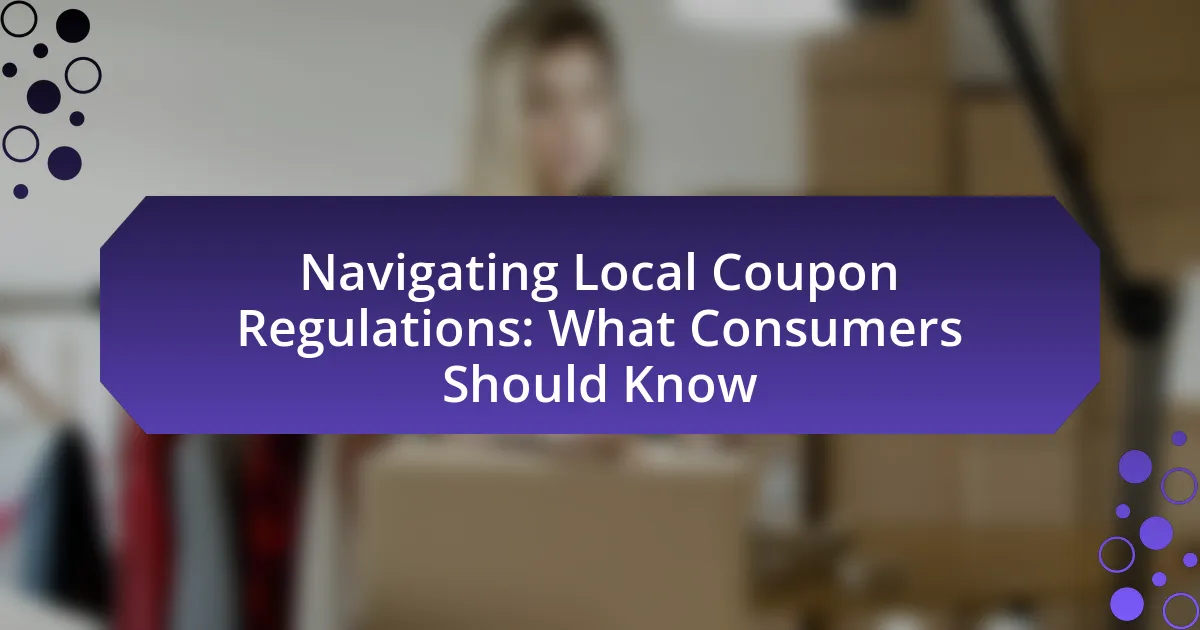Local coupon regulations are laws established by local governments to manage the issuance, distribution, and redemption of coupons, ensuring consumer protection and fair business practices. These regulations address advertising standards, expiration dates, and product eligibility, promoting transparency and preventing misleading offers. Understanding these regulations is crucial for consumers to avoid financial loss and exploitation by businesses. The article explores the importance of local coupon regulations, the risks consumers face without this knowledge, the types of regulations that exist, and best practices for navigating these laws effectively. Additionally, it highlights resources available for consumers to stay informed about local coupon laws and maximize their savings while adhering to regulations.

What are Local Coupon Regulations?
Local coupon regulations are laws and guidelines established by local governments to govern the issuance, distribution, and redemption of coupons within their jurisdictions. These regulations often address issues such as advertising standards, expiration dates, and the types of products eligible for discounts, ensuring consumer protection and fair business practices. For example, some municipalities may require that coupons clearly state their terms and conditions to prevent misleading advertising, thereby safeguarding consumer rights.
Why are Local Coupon Regulations Important for Consumers?
Local coupon regulations are important for consumers because they ensure fair practices and protect against fraudulent activities. These regulations help maintain transparency in coupon distribution, preventing misleading offers that could exploit consumers. For instance, regulations often require clear terms and conditions, which help consumers understand the limitations and validity of coupons. Additionally, local regulations can promote competition among businesses, leading to better deals for consumers. According to the Federal Trade Commission, clear guidelines on advertising and promotions, including coupons, help safeguard consumer interests and foster trust in the marketplace.
How do Local Coupon Regulations Protect Consumers?
Local coupon regulations protect consumers by ensuring that promotional offers are transparent, truthful, and not misleading. These regulations require businesses to clearly disclose terms and conditions associated with coupons, such as expiration dates and restrictions on usage. For instance, the Federal Trade Commission enforces truth-in-advertising laws that mandate accurate representation of discounts, preventing deceptive practices that could mislead consumers about the value of a coupon. Additionally, local regulations may impose penalties on businesses that fail to comply, thereby incentivizing adherence to consumer protection standards.
What Risks Do Consumers Face Without Understanding These Regulations?
Consumers face significant risks without understanding local coupon regulations, including financial loss, legal penalties, and exploitation by unscrupulous businesses. Financial loss occurs when consumers unknowingly use expired or invalid coupons, resulting in wasted money. Legal penalties can arise from misuse of coupons that violate specific regulations, leading to fines or other legal repercussions. Additionally, consumers may be exploited by businesses that take advantage of their lack of knowledge, such as misleading advertising or hidden fees. Understanding these regulations is crucial for consumers to protect themselves from these potential risks.
What Types of Local Coupon Regulations Exist?
Local coupon regulations vary by jurisdiction and typically include restrictions on advertising, usage, and expiration. These regulations can dictate how coupons are distributed, such as requiring businesses to register their coupons with local authorities or limiting the types of discounts that can be offered. For instance, some municipalities may prohibit coupons that promote alcohol or tobacco products, while others may enforce rules on the maximum discount percentage allowed. Additionally, regulations may require clear disclosure of terms and conditions associated with coupon use, ensuring consumers are informed about expiration dates and limitations. These local laws aim to protect consumers and maintain fair competition among businesses.
How Do Different States Approach Coupon Regulations?
Different states approach coupon regulations with varying degrees of strictness and specificity. For instance, some states, like California, have comprehensive laws governing the use of coupons, including requirements for clear expiration dates and restrictions on misleading advertising. In contrast, states such as Texas have more lenient regulations, allowing businesses greater flexibility in how they issue and manage coupons. This variation is often influenced by local consumer protection laws and the overall regulatory environment within each state, which can lead to significant differences in how coupons are marketed and redeemed.
What Are Common Restrictions Imposed on Coupons?
Common restrictions imposed on coupons include expiration dates, specific product limitations, and usage frequency limits. Expiration dates dictate the timeframe within which a coupon can be redeemed, often ranging from a few weeks to several months. Specific product limitations restrict the coupon’s applicability to certain items, excluding others, which can be seen in promotions that apply only to select brands or categories. Usage frequency limits may specify that a coupon can only be used once per transaction or per customer, ensuring that the discount is not abused. These restrictions are designed to manage promotional costs and prevent misuse, thereby maintaining the integrity of the couponing system.

How Can Consumers Navigate Local Coupon Regulations?
Consumers can navigate local coupon regulations by researching specific laws and guidelines in their area. Local regulations often dictate the types of coupons that can be issued, the expiration dates, and any restrictions on usage. For instance, some jurisdictions may require businesses to register their coupons with local authorities or adhere to specific advertising standards. Additionally, consumers should consult local government websites or consumer protection agencies for accurate information on coupon usage and any recent changes in legislation. Understanding these regulations helps consumers avoid potential legal issues and ensures they can effectively utilize coupons within their locality.
What Steps Should Consumers Take to Understand Local Regulations?
Consumers should begin by researching local regulations through official government websites, which provide accurate and up-to-date information on laws and guidelines. These websites often include sections dedicated to consumer rights and regulations specific to coupons, ensuring that consumers access reliable data. Additionally, consumers can consult local consumer protection agencies or legal aid organizations for assistance in interpreting these regulations. Engaging with community forums or attending local workshops can also enhance understanding, as these platforms often share practical experiences and insights related to local laws.
Where Can Consumers Find Reliable Information on Local Coupon Laws?
Consumers can find reliable information on local coupon laws through official state and local government websites, as these sources provide up-to-date legal guidelines and regulations. Additionally, organizations such as the Federal Trade Commission (FTC) offer resources that outline general coupon laws and practices applicable across various jurisdictions. Legal databases and consumer advocacy groups also compile information on specific state laws regarding coupons, ensuring that consumers have access to accurate and comprehensive legal information.
How Can Consumers Stay Updated on Changes in Regulations?
Consumers can stay updated on changes in regulations by regularly checking official government websites and subscribing to newsletters from regulatory agencies. Government websites, such as those of the Federal Trade Commission or local consumer protection offices, provide timely updates on regulatory changes. Additionally, many agencies offer email alerts or newsletters that inform subscribers about new regulations and amendments. Engaging with consumer advocacy groups and following relevant social media channels can also provide insights into regulatory changes affecting consumers.
What Common Mistakes Do Consumers Make Regarding Coupons?
Consumers commonly make mistakes regarding coupons by failing to read the terms and conditions, which can lead to expired or ineligible coupons being used. Many consumers overlook expiration dates, usage limits, and specific product requirements, resulting in disappointment at checkout. According to a survey by the Coupon Information Corporation, nearly 30% of consumers do not check the fine print, which can lead to misunderstandings about the coupon’s validity and restrictions. Additionally, consumers often do not stack coupons or combine them with sales effectively, missing out on potential savings.
How Can Consumers Avoid Misusing Coupons?
Consumers can avoid misusing coupons by carefully reading the terms and conditions associated with each coupon. Understanding expiration dates, usage limits, and specific product restrictions ensures that consumers use coupons correctly. For instance, a study by the Coupon Information Corporation indicates that 90% of coupon misuse occurs due to a lack of awareness about these terms. By being informed, consumers can maximize their savings while adhering to regulations.
What Should Consumers Do If They Encounter Issues with Coupons?
Consumers should contact the retailer or manufacturer directly if they encounter issues with coupons. This action allows consumers to clarify the terms of the coupon, report any discrepancies, and seek resolution. Many retailers have customer service departments specifically designed to handle coupon-related inquiries, and they may provide solutions such as honoring the coupon or issuing a refund. Additionally, consumers can refer to the terms and conditions printed on the coupon, which often outline the proper procedures for addressing issues.

What Resources Are Available for Consumers Regarding Local Coupon Regulations?
Consumers can access various resources regarding local coupon regulations through government websites, consumer advocacy organizations, and legal aid services. Government websites, such as those of state or local consumer protection agencies, often provide detailed information on coupon laws and regulations specific to the area. Additionally, organizations like the Better Business Bureau and the National Consumers League offer guidance and resources related to consumer rights, including coupon usage. Legal aid services may also assist consumers in understanding their rights and obligations concerning coupons. These resources ensure that consumers are informed about the legal framework governing coupon use in their locality.
What Online Tools Can Help Consumers Understand Coupon Regulations?
Online tools that can help consumers understand coupon regulations include websites like RetailMeNot, Coupons.com, and the Federal Trade Commission’s (FTC) official site. RetailMeNot and Coupons.com provide comprehensive information on coupon usage, including terms and conditions that often reflect local regulations. The FTC’s site offers guidelines on coupon practices and consumer rights, ensuring that users are informed about legal standards. These resources collectively empower consumers to navigate the complexities of coupon regulations effectively.
How Can Consumer Advocacy Groups Assist with Coupon Issues?
Consumer advocacy groups can assist with coupon issues by providing education, resources, and support to consumers facing challenges. These organizations often conduct research on coupon regulations and practices, helping consumers understand their rights and the proper use of coupons. For instance, they may publish guides or reports that clarify local laws regarding coupon redemption, ensuring consumers are informed about valid practices. Additionally, consumer advocacy groups can mediate disputes between consumers and retailers, offering assistance in resolving issues related to coupon acceptance or fraudulent practices. Their involvement can lead to increased accountability among businesses and better protection for consumers.
What Best Practices Should Consumers Follow When Using Coupons?
Consumers should follow several best practices when using coupons to maximize savings and ensure compliance with regulations. First, they should always read the terms and conditions of each coupon, as these details specify expiration dates, eligible products, and any restrictions. For example, a study by the National Retail Federation indicates that 90% of consumers overlook these details, which can lead to missed savings or invalid coupons.
Additionally, consumers should organize their coupons by expiration date and category to avoid last-minute scrambles and ensure they use the most beneficial offers first. Research shows that consumers who plan their shopping trips around available coupons can save an average of 20% on their grocery bills.
Lastly, consumers should be aware of local coupon regulations, as some areas have specific laws governing the use of coupons, including limits on stacking multiple coupons or restrictions on digital versus paper coupons. Understanding these regulations helps consumers avoid potential legal issues and ensures they are using coupons effectively.
How Can Consumers Ensure They Are Complying with Local Regulations?
Consumers can ensure compliance with local regulations by researching and understanding the specific laws and guidelines that apply to their area. This can be achieved by consulting local government websites, reviewing consumer protection laws, and staying informed about any updates or changes in regulations. For instance, many municipalities provide resources that outline coupon usage, promotional offers, and advertising standards, which can help consumers navigate the legal landscape effectively. Additionally, engaging with local consumer advocacy groups can provide insights and support in understanding these regulations.
What Tips Can Help Consumers Maximize Their Savings While Following the Rules?
Consumers can maximize their savings while following the rules by strategically using coupons, understanding local regulations, and planning purchases. Utilizing digital coupons and loyalty programs can enhance savings, as many retailers offer exclusive discounts through their apps or websites. Additionally, consumers should familiarize themselves with local coupon policies, such as expiration dates and stacking rules, to ensure compliance and avoid penalties. Research indicates that consumers who actively track their spending and utilize budgeting tools save an average of 20% more than those who do not. By combining these strategies, consumers can effectively increase their savings while adhering to regulations.



